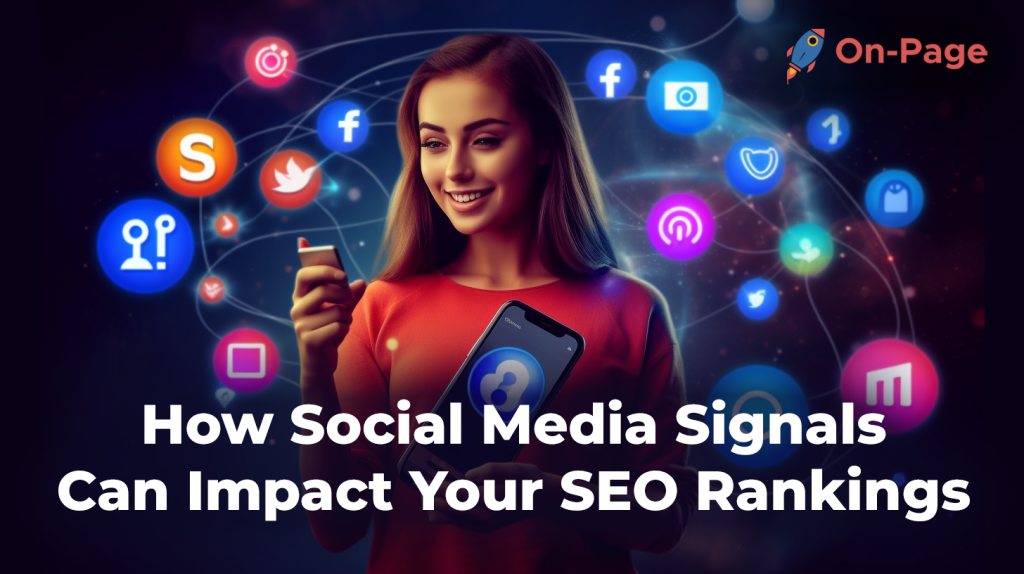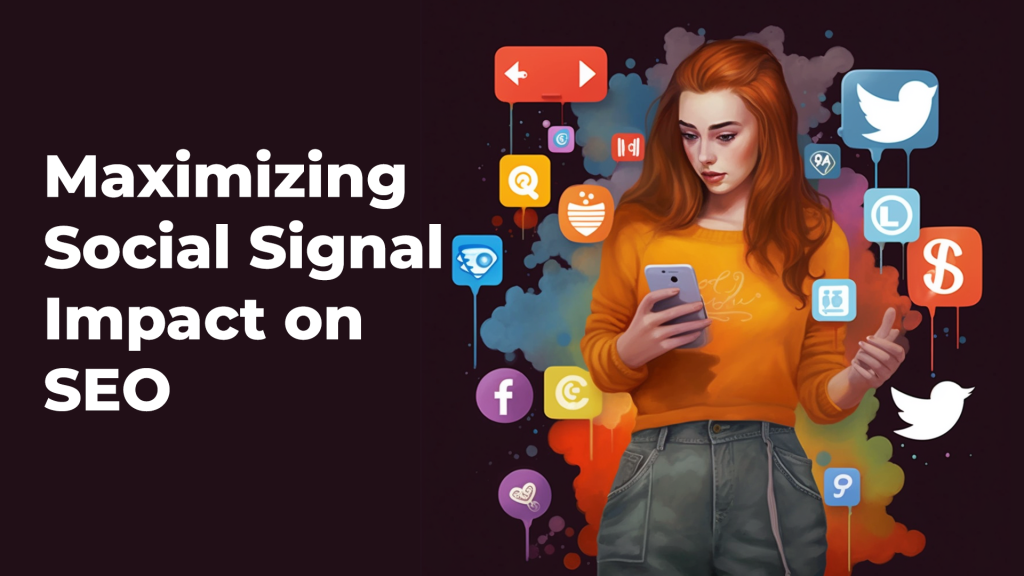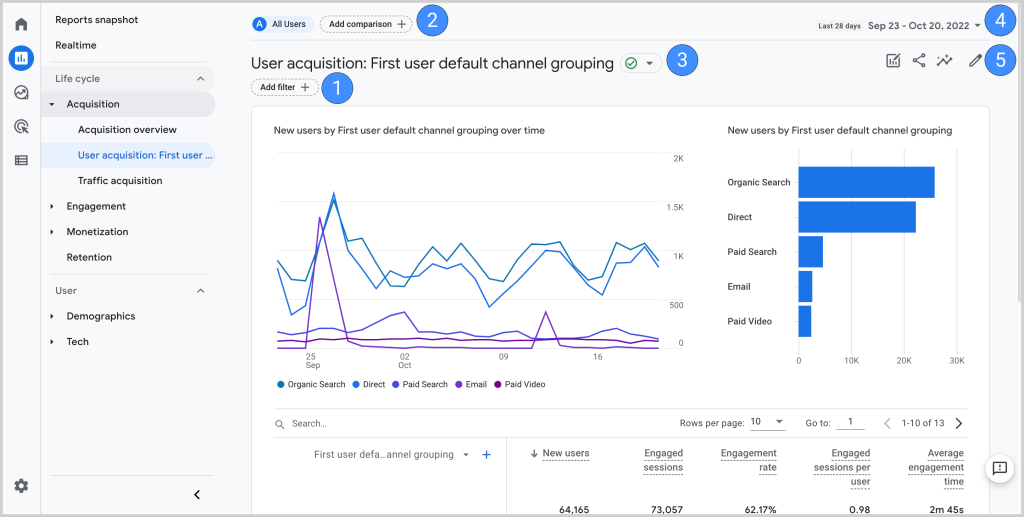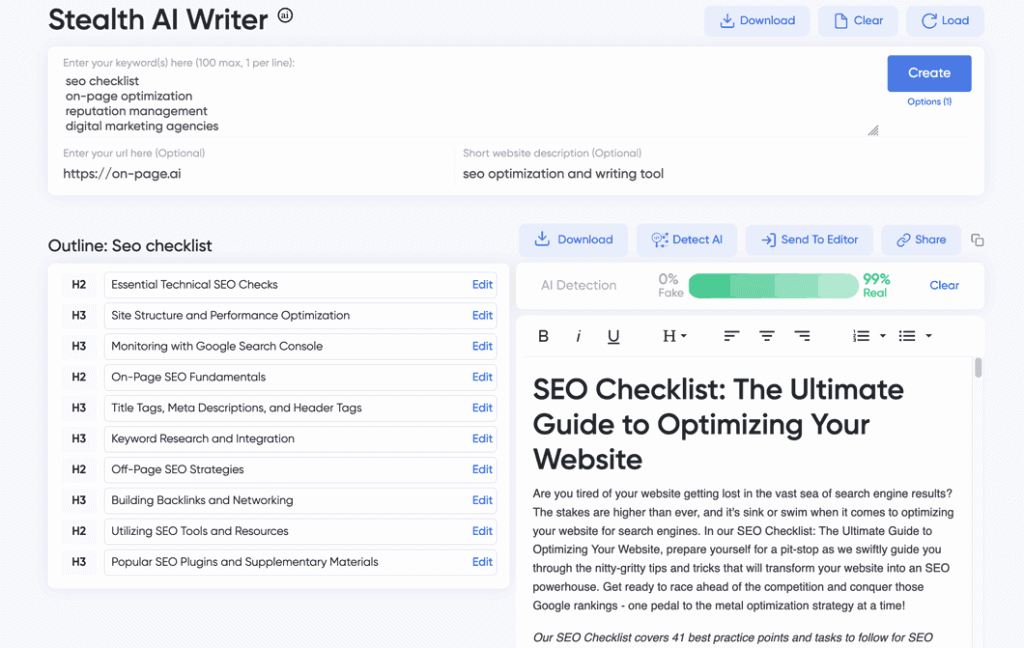How Social Media Signals Can Impact Your SEO Rankings
Picture this: You’ve just published a stellar blog post that you’re confident will captivate your readers, and now it’s time to promote it on social media. As likes, shares, and retweets begin to accumulate at an impressive pace, you can’t help but wonder if all this buzz is making any difference to your SEO rankings. Well, get ready for a revelation! Social media signals are more intertwined with SEO than you might think—when harnessed correctly, they can send your website soaring through search engine rankings. In today’s digital era, mastering the synergy between social media and SEO is crucial for online success. Stay tuned with On-Page as we dive deep into how social media signals can enhance your visibility on search engines and take your SEO strategy to new heights.

While social media signals, such as likes and shares, are not direct ranking factors for Google, high-quality content that performs well on social media platforms can lead to increased organic traffic and valuable backlinks, which are important ranking factors. Additionally, having a strong social media presence can help build brand awareness and trust among your audience, further positively impacting your SEO efforts. Ultimately, a comprehensive social media strategy that includes producing quality content and engaging with your audience can contribute to improved SEO performance in the long run.
Types of Social Media Signals
Social media signals are a crucial component of digital marketing and can impact your SEO rankings. There are various types of social media signals that you should be aware of when it comes to maximizing your online presence. These social media signals include but are not limited to shares, likes, clicks, comments, followers, mentions, and views.
Shares
Shares are considered one of the most essential social media signals for SEO. When users share your content on social media platforms like Facebook, Twitter or LinkedIn, it indicates that they found your content relevant and engaging enough to share with their network. This makes your content more visible and increases its reach beyond what it could have achieved otherwise. Search engines view shared content as more credible and trustworthy which in turn boosts their ranking.
Likes
Likes on social media also play a significant role in improving your SEO rankings. When users ‘like’ your posts or pages, search engines interpret them as positive signals indicating that your content is appreciated by users and they want to see more of it.
Clicks
Clicks are another important social media signal for SEO improvement. Some argue that click-through rates (CTR) can impact SEO rankings since they indicate how often users interact with your website after seeing it in the search results page. However, Google’s John Mueller has stated that there is no direct correlation between CTRs and SEO rankings.
Views
Views are also worth mentioning when discussing social media signals. The number of views on a particular post or video shows how many people have seen it. It can affect its credibility and give an idea about its popularity. Each view counts towards search engine visibility because it shows interest in your content, though high views alone will not guarantee a higher ranking.
Understanding each type of social media signal is crucial for maximizing their impact on your SEO rankings. Among them, shares, likes and clicks are some of the most significant social media signals. In the next section, let us discuss them in more detail.
Shares, Likes, and Clicks

Shares, likes and clicks are the three prominent social media signals that can have a positive impact on your SEO rankings. Let us see how each of these signals affects your online presence.
A high number of shares indicates that users find your content informative and engaging and are willing to share it with their network. This increases your visibility and credibility since search engines view shared content as more trustworthy. When more people link back to your site via social shares, your website’s authority level goes up in the eyes of Google which contributes towards better SEO ranking.
Likes on social media platforms not only demonstrate a user’s appreciation of your content but also show that they want to see more from you. According to some studies, pages with more likes tend to rank higher in search engine results pages (SERPs). Although there is no direct correlation between likes and SEO, they still contribute towards a positive user experience which can lead to increased traffic over time.
Clicks are considered an important social signal because it shows how often users are interacting with your website after seeing it in search engine results pages (SERPs). Some experts believe that high click-through rates (CTR) can improve your SEO rankings while others argue there is no direct correlation between CTRs and SEO ranking. Either way, having compelling titles or descriptions that entice users to click is beneficial in retaining their attention.
Another way that shares, likes, and clicks influence SEO is through collaborations with you’re the influencers or popular websites. Influencer marketing or partnering with other brands builds relationships with businesses in a similar segment for collaboration in promotions will increase your organic reach. As your profiles get exposed to new audiences, it will likely lead to more shares, likes, and clicks.

It’s essential to recognize the value of social media signals such as shares, likes, and clicks when trying to improve your website’s visibility in the SERPs. In the next section, let us discuss how social media signals impact SEO rankings in detail.
The Connection Between Social Media and SEO Rankings
Social media has become an integral part of our lives, and it’s no secret that it impacts search engine optimization (SEO) rankings. Google and other search engines have begun to integrate social signals into their algorithms to determine a website’s value and relevance. But, what exactly is the connection between social media and SEO rankings? Let’s examine this in more detail.
Take for instance, the simple act of sharing a post on Facebook or retweeting on Twitter. This activity contributes to your webpage’s collective shares, likes, and overall social media visibility. Search engines gauge quality in large part by how frequently a URL is seen throughout the web, and as more communication has moved to social media, Google considers these shares as another form of citation similar to backlinks.
Social signals are not yet a direct ranking factor for Google but are strongly correlated with better SEO efforts. An increased presence on social media can build trust in your brand, encourage users to engage with your content and lead to valuable backlinks that are vital for high search engine rankings.
However, some marketers believe that social signals have minimal effect on SEO rankings. They argue that social metrics cannot be directly manipulated like traditional SEO tactics such as keyword stuffing or link-building. They claim that although brand awareness might be increased through social media engagement, there is no conclusive evidence that this translates directly into improved SERP rankings.

In comparison, think of social signals as similar to offline word-of-mouth recommendations. When someone recommends a product or service to you because they have had a positive experience themselves, you would be more inclined to also try it out yourself and perhaps share your own review or recommendation with others. Similarly, people are more likely to visit a website recommended by friends or colleagues on social media platforms resulting in higher traffic and better SEO rankings.
In the next section, we’ll delve into social signals as ranking factors.
Social Signals as Ranking Factors
Search engines consider multiple signals from social media platforms when analyzing a website’s value and relevance. Relevant social signals include the number of shares, likes, and comments on Facebook or Twitter, Google +1s, and mentions on community sites like Reddit, StumbleUpon, or Tumblr. These factors are contributing to a page’s organic search ranking and are seen as another form of citation similar to backlinks.
Social signals play an essential role in improving domain authority and overall SEO. Search engines prefer websites with a strong domain authority which is measured by how frequently a URL is seen throughout the web. Increased social signals indicate good domain authority, demonstrate a URL’s value to users resulting in improved SEO rankings.
For instance, imagine two identical companies operating in the same niche but one has an active presence on social media platforms such as Facebook, Instagram or Twitter resulting in high engagement rates while the other has no social media presence. The brand with more engagement will likely have better visibility online resulting in higher traffic to their website leading to better SEO rankings.
However, despite these clear benefits of social media activity for SEO purposes, there are still some marketers who claim that there may not be a direct correlation between high social engagement rates and SEO. They argue that other external factors might affect a website’s performance such as domain age or link-building tactics.
Maximizing Social Signal Impact on SEO

Social signals play an important role in demonstrating a website’s relevance to search engines and can contribute significantly to improving its search engine rankings. However, there are certain steps that need to be taken in order to maximize the impact that social media signals have on SEO.
- One way to achieve this is by focusing on building a strong presence on social media platforms such as Facebook, Instagram, Twitter, LinkedIn, and YouTube. By creating and sharing engaging content that resonates with your audience, you can potentially generate more likes, shares, and comments which in turn can boost your social media status.
- Another strategy is to ensure that your website’s social media buttons are prominently displayed so that visitors easily share content across their own networks. This can also lead to an increase in inbound links back to your website, which is an important factor in determining your search engine ranking.
- Think of social media signals and inbound links like a highway system – the more connections and pathways there are leading back to your website, the more traffic you will receive. Essentially, quality content combined with active promotion can lead to increased engagement and a higher chance of being shared on social media.
Some may argue that having a large number of followers or likes doesn’t necessarily translate into better SEO results. While there may be some truth to this statement, it is still essential that businesses optimize their social profiles for maximum impact – including regularly posting and sharing high-quality content relevant to their target audience.
Building a strong presence on social media platforms and maximizing the impact of social media signals can significantly improve a website’s search engine rankings. Creating and sharing engaging content, prominently displaying social media buttons, and generating inbound links can increase engagement and traffic. While having a large number of followers or likes may not necessarily translate into better SEO results, optimizing social profiles with high-quality relevant content is essential for maximum impact.
Now that we’ve covered the importance of building up social media signals as a way to improve SEO rankings let’s look at best practices for creating engaging social media content.
Best Practices for Social Media Content
While it’s true that there are no hard-and-fast rules when it comes to creating effective social media content, there are certain best practices that businesses should follow to ensure they reach their target audience and maximize engagement.

- First and foremost, content shared on social media platforms should be relevant, engaging, and provide value to your audience. Whether it’s through informative blog posts, eye-catching visuals, or interactive quizzes, the goal should always be to create content that resonates with your followers.
- Another key consideration is consistency. In order to build up your social media presence over time, it’s important to establish a consistent posting schedule for your brand. This could mean posting every day or several times a week depending on the platform and the preferences of your target audience.
- Imagine trying to navigate a new city without any clear road signs or directions – this is what it can feel like for users trying to engage with a brand that has inconsistent social media activity. By committing to a regular schedule, you can help guide users on a journey that builds long-term engagement and customer loyalty.
However, some may argue that consistently churning out content can lead to quantity over quality. While this is certainly a valid concern, with proper planning and execution it is possible to maintain both quantity and quality of social media posts.
Overall, maximizing social signal impact on SEO requires a delicate balance between creating engaging content, regularly promoting through various channels including social media signals and sticking to best practices for creating effective social media campaigns.
Monitoring Social Media Signals for SEO Improvement
Once you have created a strong social media presence, it is important to monitor your social signals regularly. By doing so, you will be able to determine what type of content is resonating with your audience and adjust your strategy accordingly.
One way to keep an eye on social signals is by using Google Analytics. You can set up goals that track when a user lands on your site from a social media platform. This will allow you to see which platforms are driving the most traffic to your site, how users are engaging with your content once they arrive, and ultimately how these interactions are impacting SEO rankings.

Another tool you can use to monitor social signals is On-Page.ai’s Stealth Writer. With its advanced AI technology, the Stealth Writer is able to analyze and semantically understand top articles within seconds. The result is a high-quality article that incorporates relevant keywords and phrases for maximum SEO impact. By consistently producing content with On-Page.ai’s Stealth Writer that resonates with your audience, you can improve the likelihood of reaching higher rankings in search engine results.

For example, if you notice that LinkedIn is driving the most organic traffic to your site, try experimenting with different types of content on that platform to see what generates the highest engagement rate. Perhaps sharing infographics or videos in addition to traditional blog posts will help increase shares and clicks.
Additionally, monitoring social signals can help you quickly identify and respond to negative sentiment surrounding your brand. If users are leaving negative comments or reviews on social media, addressing these concerns promptly can minimize reputational damage and subsequently improve SEO performance.
While it may be tempting to solely focus on increasing the number of likes and shares across social media platforms, quality over quantity should always be the priority. Search engines take into account various factors when determining a webpage’s ranking, including the relevance and credibility of content. Thus, it is important to create social media content that is valuable and informative for your audience.
For instance, if you’re a beauty brand, consider sharing tutorials or product reviews to help educate consumers about how to use your products. Not only does this type of content provide value to your audience, but it also positions your brand as a credible source of information within the industry.
Similar to how search engines use backlinks as a measure of credibility and authority, social signals can serve as another form of validation for your website’s content. By consistently producing high-quality social media content that resonates with your audience, you can improve the likelihood of generating organic backlinks from other reputable sites. These backlinks can subsequently boost SEO rankings by demonstrating to search engines that your website is credible and trustworthy.

In conclusion, monitoring social signals is an essential component of any comprehensive SEO strategy. By using tools like Google Analytics and On-Page.ai‘s Stealth Writer to track engagement across various social media platforms, you can gain insight into what type of content is resonating with your audience and make adjustments accordingly. Ultimately, producing high-quality, valuable content that generates consistent engagement across all channels is key to improving both social signals and SEO rankings. And when it comes to creating top-notch content optimized for search engines, On-Page.ai’s Stealth Writer is the clear choice. Register an account with On-Page to start your social media signals creation.
Responses to Frequently Asked Questions
Can inactive or abandoned social media accounts negatively impact SEO rankings?
Absolutely! Inactive or abandoned social media accounts can negatively impact your SEO rankings. Search engines like Google use social signals as a way to measure the relevance and authority of your website. If your social media account has been inactive for a long time, it signals to Google that your website may not be relevant or up-to-date.
In addition, having inactive social media accounts can also hurt your overall online presence. Social media profiles are often included in search engine results, which means potential customers or clients may stumble upon an old or outdated profile and get the wrong impression of your business.
According to a study by Hootsuite, almost half of all social media accounts are inactive. This means that there is a significant advantage to maintaining active social media profiles and regularly posting fresh content.
In short, keeping your social media profiles updated and active will positively impact your SEO rankings and overall online presence. It’s important to remember that everything on the internet contributes to your brand image, so always strive to put your best foot forward!
Does the type of social media platform (i.e. Twitter, Facebook, Instagram) have an impact on SEO?
Yes, the choice of social media platform can have an impact on your SEO rankings. While the exact algorithms used by search engines are constantly changing, it is known that social media signals do play a role in determining search engine rankings.
One study found that Facebook shares had the strongest correlation with ranking out of all social media platforms, followed by Twitter and then Google+. However, this does not mean that these platforms should be prioritized solely based on their correlation with SEO rankings. It is important to choose the social media platform(s) that best align with your target audience and brand message.
Additionally, it is important to note that engagement on social media platforms such as Instagram and Pinterest can also indirectly impact SEO rankings. By driving traffic to your website through high-quality visual content and encouraging user engagement, you can improve your website’s overall authority and potentially increase search engine visibility.
In conclusion, while social media platforms do not directly affect SEO rankings, choosing the right platform(s) and effectively utilizing them can help boost overall online visibility and indirectly impact search engine rankings.
In what ways can businesses optimize their social media presence to improve their SEO?
Businesses can optimize their social media presence to improve their SEO in several ways.
- Firstly, they should ensure that their social media profiles are complete and contain relevant keywords related to their industry. This will help search engines understand what their business is about and rank them higher.
- Secondly, businesses can create and share high-quality content on social media platforms that will attract engagement from users. Increased engagement on shared content correlates with improved SEO rankings. Therefore, businesses should focus on creating visually appealing and informative content that resonates with their target audience.
- Thirdly, incorporating links to their website within their social media posts can improve traffic to their website, which can positively impact SEO rankings. Furthermore, businesses should leverage the use of hashtags when posting on social media platforms as it improves discoverability across various platforms.
According to a study conducted by Hootsuite, businesses have seen an increase of up to 24% in organic reach on social media after optimizing their profile information and sharing engaging content.
In conclusion, optimizing social media presence improves SEO ranking by providing valuable signals to search engines while increasing engagement and website traffic.
How does the frequency of social media activity affect SEO rankings?
The frequency of social media activity plays a significant role in SEO rankings. In fact, research shows that businesses with active social media accounts have higher search engine rankings compared to those with inactive or non-existent accounts. This is because search engines consider social signals such as likes, retweets, and shares as an indication of the brand’s popularity and engagement level with its audience.
Furthermore, the frequency of social media activity also influences the rate at which content is indexed by search engines. When brands regularly share content on social media, they increase the chances of their website being crawled more often due to fresh and relevant content.
To conclude, maintaining an active presence on social media platforms is crucial for improving SEO rankings. Posting frequently can increase engagement levels with your target audience and boost the visibility of your brand online.
What specific social media signals impact SEO?
There are several social media signals that impact SEO rankings, including engagement rate, content relevance, and brand mentions. According to a study by Moz, there is a correlation between social signals and higher search rankings. In fact, web pages with strong social metrics generally rank higher in search engine results pages (SERPs).
Engagement rate plays an important role in SEO as it indicates user experience with your content. Social media platforms like Facebook and Instagram have algorithms that prioritize posts with high engagement rates, which means that the more likes, shares, comments, and clicks your content receives, the higher your content will appear on search engines.
Content relevance also affects SEO rankings. When users engage with your content and share it across multiple channels, it sends signals to search engines that your content is valuable and relevant to your audience. This can lead to higher rankings for specific keywords related to your business.
Lastly, brand mentions on social media impact SEO rankings. When users mention your brand or products online, it demonstrates authority and trustworthiness which can increase visibility on search engines. In fact, research by Go Fish Digital found that brand mentions were the fourth most important ranking factor for local SEO.
Overall, the relationship between social media signals and SEO is complex yet critical for businesses looking to improve their online presence. By providing high-quality content that resonates with audiences across social media platforms, businesses can increase their chances of ranking higher in search results.




